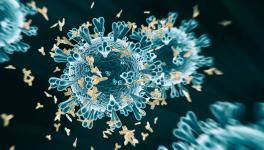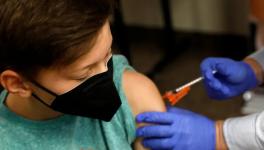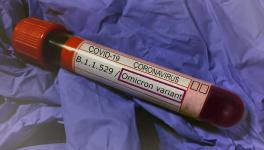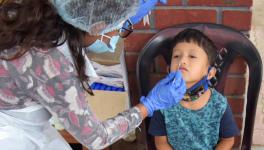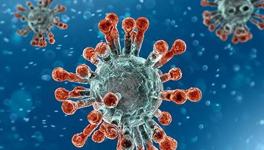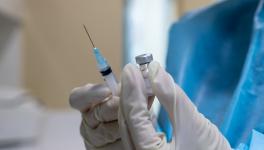Delta Variant: Whether ‘P681R’ Mutation in the Spike is Behind its Heightened Contagiousness
The Delta variant has significantly influenced the course of the pandemic. The extraordinary contagiousness of the variant is amongst the main concerns for scientists and public health experts. Its efficiency to out-compete other variants has turned it into a dominant driver of the pandemic in many parts of the world.
The SARS-CoV-2 virus has undergone many changes from its original form, resulting in newer variants, such as Alpha, Delta, Kappa etc. Newer variants have come about due to changes in the genetic architecture of the coronavirus or the mutations.
A mutation is a natural process that occurs in the gene sequences of an organism. Mutation could be so impactful, that at times, it could lead to a remarkable transformation in a virus' survival, contagiousness or the ability to create a severe form of a disease. A similar thing, in the case of the Delta variant, has made it a significant challenge to the human immune system.
While discussing the role of mutations in Delta's fast-spreading capacity, we must understand the specifics of these particular mutations that are driving its spread around the world.
Before delving into an understanding of mutations based on laboratory experiments, we must look into how gene mutations influence an organism’s traits. A gene is that part of a DNA (or RNA) molecule which directs the production of proteins in a cell; a protein is produced inside a cell according to the code inscribed in the gene (part of the DNA or RNA).
The DNA is made up of four letters (A, T, C, G) in different combinations and in the case of RNA, the four alphabets become A, U, C, G. Any protein is produced according to the code in the gene, which is a string formed by various combinations of the four letters. For a change to occur, even in a single letter, could mean that a protein becomes remarkably different in its structure and function. These changes in the genes are called mutations.
With regards to the Delta variant, a number of studies suggest that a single mutation in the spike protein may have led to Delta acquiring advantages over other variants. The spike protein is what the virus sticks with a human cell. The mutation of concern in Delta's case is known as ‘P681R’.
‘P681R’ signifies that the mutation has caused a proline (P) residue to change into an arginine. The codes in the genes direct a protein to determine the amino acids of the protein. Protein molecules are made up of amino acids in various combinations and there are 20 such amino acids. All proteins are sequences of amino acids and a mere change in one amino acid can topple up a protein- as is being argued in the case of the ‘P681R’ mutation associated with Delta.
The ‘P681R’ mutation has occurred in the region of the spike protein known as the ‘furin cleavage site (FCS)’, which is one of the intensely studied regions of the spike. The presence of the FCS raised alarms as soon as it was detected in SARS-CoV-2, because the site was not present in other coronaviruses that had previously caused global outbreaks, for example, the SARS. The FCS is also found in the heightened infectivity of other viruses, for instance, the influenza virus.
To penetrate into the human cell, the spike protein needs to undergo cleavage twice and one of the cleavage sites is the FCS, which confers the virus efficiency in entering cells.
In a study led by Pei Yong Shi, a virologist at the University of Texas Medical Branch, it was found that the spike protein is cut more efficiently in the Delta variant (containing the ‘P681R’ mutation) in comparison to Alpha.
Similar results were obtained from a study of another group of researchers led by virologist Wendy Barclay at Imperial College London. The study appeared in May in the pre-print server bioRXiv. Shi's and Barclay’s teams, in follow-up experiments, found that P681R mutation was largely associated with more efficient clipping of the spike.
Shi’s team went a step further and cultured human-airway epithelial cells in a laboratory, infecting them with equal numbers of Delta and Alpha viral particles. Results showed that Delta particles outcompeted the Alpha particles; when the P681R mutation was removed, Delta’s advantage waned. This mimicked the epidemiological patterns of outbreaks caused by Delta.
A separate study, by a team led by virologist Kei Sato of the University of Tokyo, found that spike proteins containing the P681R mutation fuse with the cell membrane three times faster than those without the mutation.
However, the P681R mutation isn't the sole reason behind Delta's dominance over other variants. Bing Chen, a structural biologist at Harvard Medical School, and his team found in their study that the Kappa variant, a cousin of the Delta, can bind to cells less efficiently, with its spike protein cleaving less frequently when compared to Delta. Notably, the Kappa variant also has P681R along with other mutations. Based on these findings, researchers have come to doubt P681R’s role in Delta’s dominance.
Ugandan researchers were reported to have found that a variant consisting of P681R was rapidly spreading in the country, but it could not match the scale of Delta’s spread. Gary Whittaker, a virologist at Cornell University, USA, led a study where his group inserted P681R mutation in the spike protein to the variant circulating in Wuhan at the beginning of the pandemic. The team found no increase in infectivity as such.
These studies hint that a single mutation may not be the sole driving force behind Delta’s super spread. The situation seems to be more complex where interplays of various other mutations clubbed with other factors have given rise to Delta’s powerful spreading. However, Delta’s ability to spread in a fast manner is still undebatable.
Get the latest reports & analysis with people's perspective on Protests, movements & deep analytical videos, discussions of the current affairs in your Telegram app. Subscribe to NewsClick's Telegram channel & get Real-Time updates on stories, as they get published on our website.









